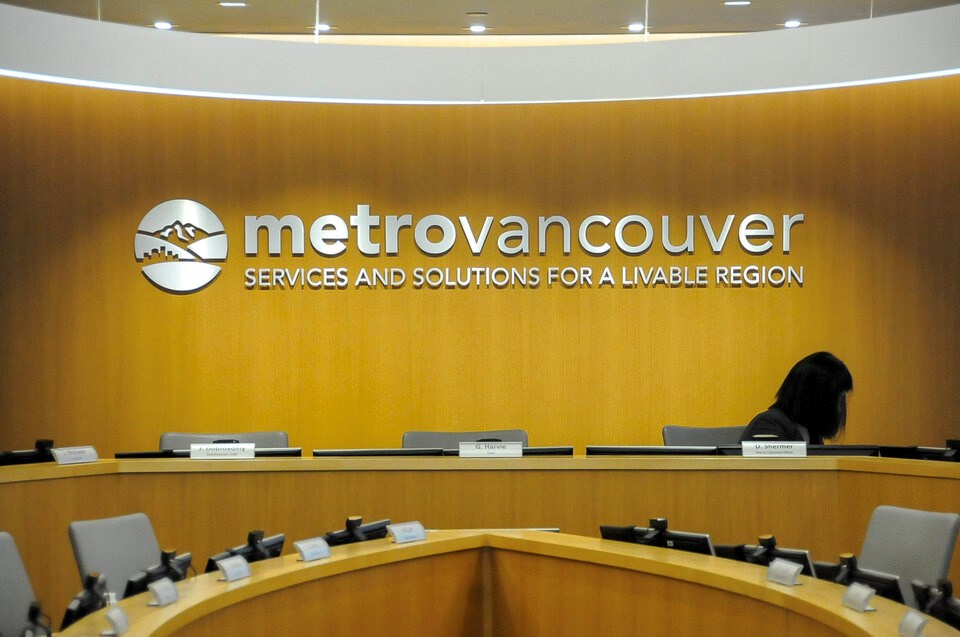Four city councillors from across Metro Vancouver are calling on B.C. Premier David Eby to review the regional body’s governance structure and replace it with elected local representatives.
In a joint press release, New Westminster Councillor Daniel Fontaine, Maple Ridge Councillor Ahmed Yousef, Surrey Councillor Linda Annie, and Richmond Councillor Kash Heed, slammed Metro Vancouver’s 50-year-old governance model as out of date and incapable of reigning in cost overruns on major capital projects. The regional body currently appoints 41 board members from 23 local governments.
“We need to take Metro out of the shadows and make it more transparent, starting with electing its board,” said Heed in a statement.
Premier Eby’s office did not immediately respond to a request for comment.
Yousef, who serves on Metro Vancouver’s liquid waste committee, pointed to at the North Shore Wastewater Treatment Plant, and the now $12 billion slated to be spent on the Iona Island Wastewater Treatment Plant in Richmond.
“There’s a lack of accountability. I don’t answer to my immediate constituents,” said Yousef in an interview with Glacier Media. “As a political animal, I’d like to see a lot more representation, efficiency.”
Councillors slam Metro over inadequate oversight, lack of transparency and frivolous spending
New Westminster's Fontaine said Metro Vancouver’s governance model makes it too easy for big infrastructure projects to become financial problems “because no one is held accountable and taxpayers are left sitting on the sideline, except when it comes to paying for the cost overruns.”
Fontaine questioned why “not a single person has resigned or been fired” over the North Vancouver overruns, a situation he said has been plagued by a lack of transparency.
“We have a government that is providing inadequate oversight,” he added in an interview. “It all really kind of begs the question, why haven’t we done this governance review before?”
The four councillors highlighted what they claim is “mission creep” with Metro Vancouver inserting itself into areas already governed by municipalities and the province. Both Annie and Yousef also noted recent revelations that outgoing Metro Vancouver Board Chair George Harvie had spent to Brisbane, Australia, in business class.
“While people are struggling with high costs of groceries, fuels and interest rates, they see that the people who are supposed to be representative of them flying business class, flying all over the world…” Yousef said. “If COVID has taught us nothing, it’s we don’t need to be in that room.”
Fontaine said the four councillors are coming forward now because they want to see the current government — and the province's three other major other political parties — take up the issue ahead of the upcoming provincial election.
Not the first attempt to reform Metro's governance structure
Metro Vancouver's current governance structure is made up of elected councillors and mayors appointed by local governments from across the region. Those elected officials are expected to represent their municipalities while also considering the health of regional services like drinking water reservoirs, wastewater systems and parkland.
It hasn't always been that way. Between 1973 and 1974, candidates for city councils were also given the option of running for one of Metro’s regional director seats. But in 1978, the province reverted the governance system to its current form, where municipalities appoint directors to the regional board, according to a Metro Vancouver spokesperson.
The spokesperson said increasing board accountability has come up periodically since then, with some people raising the prospect of a number of governance models, including amalgamating the region’s current municipal federation.
Metro Vancouver did not directly respond to the four councillors’ comments.
Correction: A previous version of this story indicated George Harvie was the former board chair of Metro Vancouver. His term, in fact, does not expire until the end of June 2024.



